Karl Marx said of religion:
Religious suffering is, at one and the same time, the expression of real suffering and a protest against real suffering. Religion is the sigh of the oppressed creature, the heart of a heartless world, and the soul of soulless conditions. It is the opium of the people.
The abolition of religion as the illusory happiness of the people is the demand for their real happiness. To call on them to give up their illusions about their condition is to call on them to give up a condition that requires illusions. The criticism of religion is, therefore, in embryo, the criticism of that vale of tears of which religion is the halo.
When Karl Marx wrote this, organized religion was very much the solace of so many people -people who might have otherwise sought more effective means of alleviating their daily suffering had this opiate not been available. Overtime, that solace was slowly eroded and replaced by an entire medicine cabinet full of “opiates.” From sports to TV, to video games and social media, there is a vast multitude of illusions we cling to today that provide a “soul to soulless conditions.”
Among them, it can easily be argued, is modern Western-style “democracy” which is perhaps one of the most insidious. Perpetually offering the promise of a better tomorrow, never actually delivered but always just one elections away from being realized – it is the strongest of all the opiates we sedate our anger, dissatisfaction, and will to effect change ourselves with.
US 2012 Elections
US elections in 2012 pitted “conservative Republican” Mitt Romney against “liberal Democrat,” Barack Obama. To so many millions of people, it was a pivotal moment in American history, with the fate of the nation, and in many ways the world, at the mercy of the electorate. In reality, the same corporate-funded policy think tanks were authoring the agendas of both men, who, while holding the position of “commander in chief,” would ultimately be at the mercy of an unelected “board of directors” consisting of corporate-financier interests that hide behind the facade of “democracy.”
Indeed, the wars, geopolitical maneuvering, and extraterritorial economic pursuits of the United States unfolding for 8 years under US President George Bush, continued or were expanded in earnest under President Obama. Wars engineered years ago under Bush were rebranded and sold under Obama. Instead of being a component of the unending “War on Terror,” they took on a more suitable “liberal,” “humanitarian” theme, however, these conflicts were nonetheless part of a predetermined, decades-spanning geopolitical campaign to maintain and expand US hegemony across the planet.
What then did the 2012 elections accomplish? They gave people the fleeting hope that the policies they’ve held in contempt under Bush would somehow be reversed, that justice would be served, and that progress would be made. Instead of effecting real change, locally and pragmatically, the people turned to their opiate of voting booths, campaign slogans, and the promise of a quick fix and in the end simply compounded their problems further.
The Arab Spring
For many, the so-called “Arab Spring” began in 2011. In reality, it was yet another barbiturate formulated by the corporate-financier elite to leverage dissatisfaction across the Middle East and North Africa (MENA), bringing in geopolitical change favorable for themselves without actually addressing any of the problems of the people they planned on using. The campaign in fact started as early as 2008 in New York City where the leaders of the Tahrir Square Egyptian protests would receive marching orders, training, and equipment from the US State Department via its inaugural Alliance of Youth Movements (AYM) summit.
For all the promises of the Arab Spring, not only in Egypt, but in other nations such as Tunisia and Libya, what clearly took place instead of a progressive revolution, was the installation of dictatorships and terror networks that have since mired each nation in varying degrees of violence, repression, and socioeconomic regression. The Western-backed Muslim Brotherhood was resurrected after the people of MENA fought decades to eradicate their fanatical, corrosive political influence. The nations of Libya and Syria in particular, have suffered the most, with their so-called “revolutions” turning into overt, violent, Western-backed proxy wars seeking regime change.
In Libya, with Western-aligned big-oil executives like Abdurrahim el-Keib literally thrust into power, the opiate-high of “democracy” rushing during the early stages of the “Arab Spring” fully crashed, leaving the people of Libya with a hangover that will last them years, if not decades.
A similar scenario has been playing out in Syria, where the narrative of “democracy” and “revolution” has also fully unraveled, leaving what is clearly a proxy war being fought by the West against the government of Syria and its allies, including Lebanon, Iran, and Russia.
With these disturbing examples illustrating the true nature of “democracy,” and the suffering, exploitation, and conflict is serves as a painkiller for, one might think the global population would be wary of its use in similar scenarios playing out elsewhere.
Ukraine
“Freedom” and “democracy” have once again been invoked in the streets of Kiev, Ukraine. Literal Neo-Nazis, with overt support from the US (with US Senator John McCain even flying to Kiev and taking to the protesters’ stage) are attempting to overrun the country and guide it into the jaws of Wall Street, London, and their EU supranational socioeconomic consolidation.
The mobs have turned violent, and carried out what is essentially a coup. Like a medieval surgeon hacking away at a doomed patient, the opium of democracy and progress are pumping through the veins of Ukraine to mask what is most likely going to be a fatal operation. In reality, nothing the protesters have demanded will lead to anything more than a geopolitical reordering of the nation. No solutions have been put forward regarding the actual socioeconomic woes the people of Ukraine face, in fact, the current trajectory of Ukraine toward the EU seems to guarantee those woes, like they have in Greece, Spain, and else where, will only be compounded.
Thailand
Western-style “democracy” has been animating the corpse of US-backed dictator Thaksin Shinawatra for nearly a decade. His regime had long lost the popularity, trust, and legitimacy it initially held back in 2001 when Thaksin first came to power in a wave of faux-populist policies. Over the years, mass murder, astronomical financial and political abuse and corruption, oppression, and violence have become the hallmarks of his regime. Starting in late 2013, protesters began filling the streets.
Protesters however, and unlike others who took to the streets during the “Arab Spring” or in Ukraine, knew simply holding “elections” would not solve the problem. They realized the system was rigged and that the term “democracy” was being abused as a facade behind which the regime carried out its multitude of crimes.

The West however, has attempted to maintain this facade, declaring the protesters “anti-democratic.” Not only is this to preserve a pro-West regime in Thailand, but to protect the reputation of “democracy” in general as the one and only solution to people’s problems.
Unlike the “Arab Spring” or in Kiev where “democracy” and “freedom” are the rallying calls, Thai protesters have a long, enumerated, and very specific list of demands. They seek to reform Thailand so that “democracy” can no longer serve as a carte blanche for a regime to hide behind. They also seek to reverse the many sovereignty-infringing policies enacted by the Thaksin regime – so unlike Ukraine that is seeking to further hand itself over to foreign interests, Thailand is attempting to do quite the opposite.
To see just how acute awareness is in Thailand regarding the non-solution that is Western-style “democracy,” recent general elections held on February 2, 2014 were boycotted by more than half the population. In some provinces, elections were not even held. Of those that did cast ballots, many elected to deface them or fill in “no vote” as a form of protest. Thais understand that “voting” is not going to fix their problems.
Understanding That Democracy is Not the Solution is the First Step of Finding Real Solutions
For Thais, and for that matter, anyone who can see through the theater of campaigns, elections, and “democracy” in general, it becomes obvious that this opiate, this attempt for us to mask our problems with quick, ineffectual solutions, is untenable. Understanding this may leave us apparently rudderless, our ills entirely unaddressed. However, understanding this, as Marx suggested, is the first step toward finding real solutions.
In Thailand, the various ministries charged with administering the country are incapable of doing so. Without a functioning government, it is up to the people themselves to get organized locally and begin solving problems themselves. For the protest itself, rice farmers that have gone unpaid for now over half a year, are being helped through charity of various kinds. Ideas on how to pragmatically restore the agricultural industry in Thailand are being explored, and individuals are taking the initiative to empower farmers with knowledge and skills that will serve them a lifetime, rather than temporary and tenuous handouts that may or may not be there for them tomorrow.
Similarly in Ukraine, those with genuinely good intentions, falling into the Western trap of “democracy promotion,” would serve themselves better to enumerate their real problems and real solutions to them. Certainly a poor economy and a lack of opportunities cannot be cured by stuffing a piece of paper into a ballot box, empowering others to do what is both our own right and duty to perform.
Economies can be lifted up by education, institutions, organization, collaboration, and innovation – none of which requires a corrupt politician or a treaty with the EU to acquire. Around the world, people are organizing themselves locally to pursue new models of economic prosperity, innovation, education, and real pragmatic progress, independently of traditional political paradigms.
With the “Arab Spring” in ruinous flames in hindsight, we can see the damaging effects our addiction to the opiate of Western-style “democracy” has wrought. It is to numb us to our situation so that we never desire to truly rectify it with lasting, real solutions. Had the Arabs enumerated their real, daily grievances and formulated constructive, pragmatic solutions to solve them, they could have avoided a cycle of struggle, violence, and conflict that have left them demonstrably worse off today than when their “revolution” started in 2011. The “Arab Spring” was a failure because those that engineered it never intended for it to be a success – at least not in terms of lifting people up and moving their nations forward.
Before we expend any more energy debating politics, discussing candidates, and rushing off to the voting booth to “fix” our problems, we must realize that by doing this, we have never actually “fixed” anything. We have simply granted the corrupt special interests that dominate and drive our destiny more time to continue enriching themselves at our expense, but always behind a carefully orchestrated facade of “democracy.” When next protesters take to the streets, or a dictatorship attempts to hide behind this facade of “democracy,” let us try to unravel what the real issues are and what real solutions there might be to sort them out before the blood begins to flow, the smoke begins to billow, and the cycle of political struggle continues to turn perpetually beyond the benefit of the people.
Tony Cartalucci, Bangkok-based geopolitical researcher and writer, especially for the online magazine “New Eastern Outlook”





 del.icio.us
del.icio.us
 Digg
Digg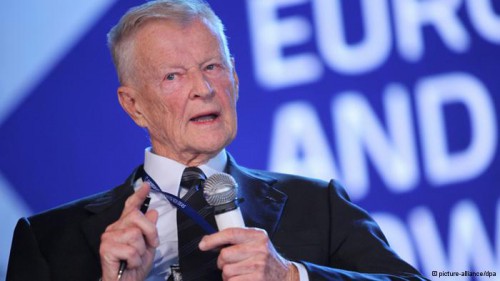
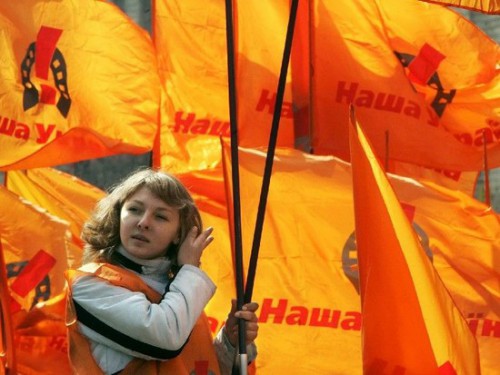
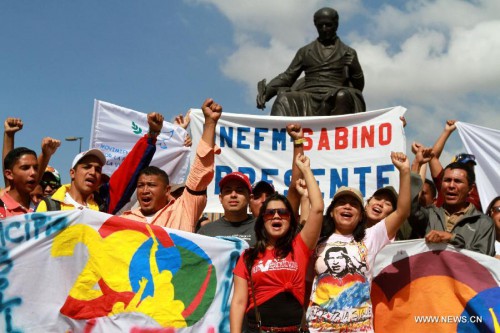








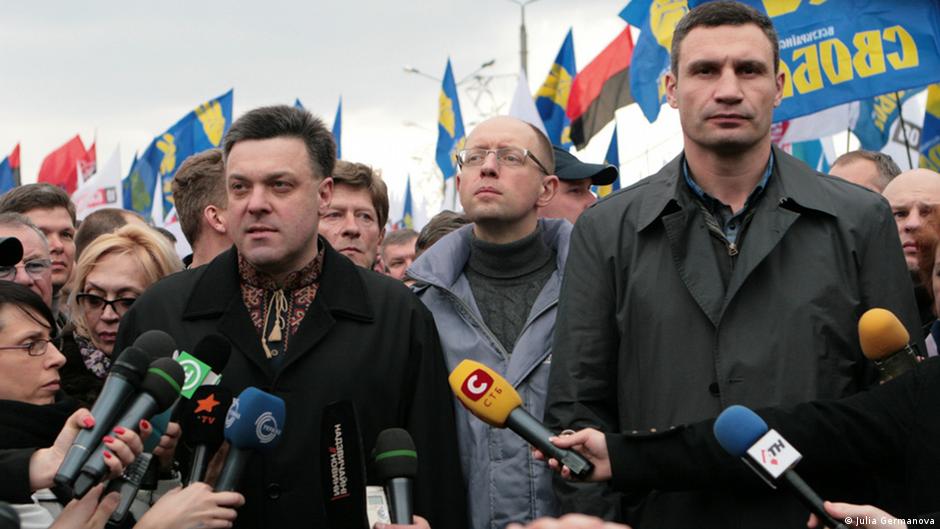







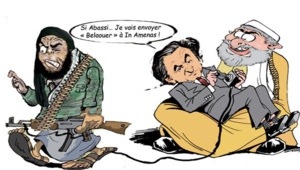
 Am 10. Oktober 1998 wurde in der damaligen Bundesrepublik Jugoslawien die Organisation OTPOR (der Widerstand) gegründet.1 Viele ihrer Mitglieder waren Studierende und Angehörige der Nomenklatur der Bundesrepublik Jugoslawien. Die Mitglieder von OTPOR analysierten die Schwachstellen des Regimes von Miloševic und erstellten einen Strategieplan, mit Hilfe dessen sie das Regime zu Fall bringen wollten. Zu Beginn beschränkten sich die Agitationen von OTPOR auf die Universität Belgrad. Während des Nato-Luftkrieges «Allied Force» gab es keine Aktionen von OTPOR. Ab 2000 setzten die Aktivitäten gegen das Regime wieder ein. Während der Wahlen vom September 2000 in Jugoslawien wurde die Stimmung gegen Miloševic mit Schlagwörtern wie «Gotov Je» (er ist erledigt) oder «Vreme Je» (es ist Zeit) angeheizt.2 Am 5. Oktober 2000 wurde Miloševic gestürzt. Während jenes Jahres setzte OTPOR die gesamte Bandbreite der taktischen Mittel der politischen Agitation ein. Miloševic wurde lächerlich gemacht, Strassensperren wurden errichtet, Boykotts wurden ausgerufen, der Gegner durch Falschmeldungen in die Irre geführt und öffentliche Gebäude wurden besetzt. Die Kommunikation zwischen den verschiedenen Gruppen erfolgte mit Hilfe des Internets.
Am 10. Oktober 1998 wurde in der damaligen Bundesrepublik Jugoslawien die Organisation OTPOR (der Widerstand) gegründet.1 Viele ihrer Mitglieder waren Studierende und Angehörige der Nomenklatur der Bundesrepublik Jugoslawien. Die Mitglieder von OTPOR analysierten die Schwachstellen des Regimes von Miloševic und erstellten einen Strategieplan, mit Hilfe dessen sie das Regime zu Fall bringen wollten. Zu Beginn beschränkten sich die Agitationen von OTPOR auf die Universität Belgrad. Während des Nato-Luftkrieges «Allied Force» gab es keine Aktionen von OTPOR. Ab 2000 setzten die Aktivitäten gegen das Regime wieder ein. Während der Wahlen vom September 2000 in Jugoslawien wurde die Stimmung gegen Miloševic mit Schlagwörtern wie «Gotov Je» (er ist erledigt) oder «Vreme Je» (es ist Zeit) angeheizt.2 Am 5. Oktober 2000 wurde Miloševic gestürzt. Während jenes Jahres setzte OTPOR die gesamte Bandbreite der taktischen Mittel der politischen Agitation ein. Miloševic wurde lächerlich gemacht, Strassensperren wurden errichtet, Boykotts wurden ausgerufen, der Gegner durch Falschmeldungen in die Irre geführt und öffentliche Gebäude wurden besetzt. Die Kommunikation zwischen den verschiedenen Gruppen erfolgte mit Hilfe des Internets.

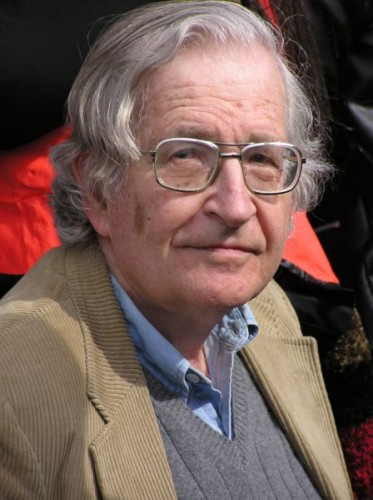
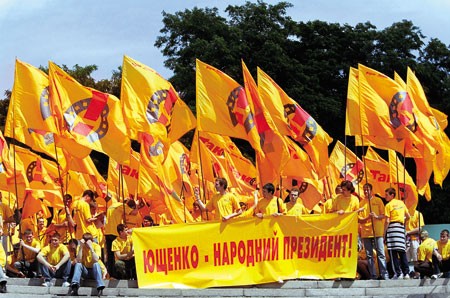 Le sort de la “révolution orange” en Ukraine, Monsieur James Woolsey y tient. Il ne peut en être autrement, puisqu’il est le directeur de la “Freedom House”, une organisation non gouvernementale américaine qui possède des sièges à Washington, New York, Budapest, Bucarest, Belgrade, Kiev et Varsovie. Elle se définit comme “une voix claire et forte qui veut la démocratie et la liberté pour le monde” et qui s’active “pour promouvoir les valeurs démocratiques et pour s’opposer aux dictatures”. Ce Monsieur James Woolsey dirige une brochette de politiciens, d’universitaires, d’industriels et d’intellectuels “transversaux”. Ce Monsieur James Woolsey a été, il y a quelques années, en 1995, le directeur de la CIA avant de s’occuper à “exporter la démocratie et la liberté dans le monde”. Grâce aux efforts d’innombrables activistes, issus de la “Freedom House”, et grâce à l’assistance économique, si charitable, d’autres organismes, comme ceux, bien connus, que sont les Fondations Soros et Ford, ce Monsieur James Woolsey —dont les “honnêtes activités” s’étendent maintenant sur plus de soixante années— peut désormais concentrer ses efforts dans “la lutte pour la liberté”, dans des pays meurtris et abrutis par une quelconque mélasse dictatoriale. Le palmarès de Woolsey et de ses amis est impressionnant : ils ont soutenu le “Plan Marshall” en Europe, favorisé la création de l’OTAN dans les années 40 et 50, multiplié leurs activités au Vietnam pendant et après la guerre menée par ce peuple contre les Américains; ils ont financé Solidarnosc en Pologne et l’opposition “démocratique” aux Philippines dans les années 80.
Le sort de la “révolution orange” en Ukraine, Monsieur James Woolsey y tient. Il ne peut en être autrement, puisqu’il est le directeur de la “Freedom House”, une organisation non gouvernementale américaine qui possède des sièges à Washington, New York, Budapest, Bucarest, Belgrade, Kiev et Varsovie. Elle se définit comme “une voix claire et forte qui veut la démocratie et la liberté pour le monde” et qui s’active “pour promouvoir les valeurs démocratiques et pour s’opposer aux dictatures”. Ce Monsieur James Woolsey dirige une brochette de politiciens, d’universitaires, d’industriels et d’intellectuels “transversaux”. Ce Monsieur James Woolsey a été, il y a quelques années, en 1995, le directeur de la CIA avant de s’occuper à “exporter la démocratie et la liberté dans le monde”. Grâce aux efforts d’innombrables activistes, issus de la “Freedom House”, et grâce à l’assistance économique, si charitable, d’autres organismes, comme ceux, bien connus, que sont les Fondations Soros et Ford, ce Monsieur James Woolsey —dont les “honnêtes activités” s’étendent maintenant sur plus de soixante années— peut désormais concentrer ses efforts dans “la lutte pour la liberté”, dans des pays meurtris et abrutis par une quelconque mélasse dictatoriale. Le palmarès de Woolsey et de ses amis est impressionnant : ils ont soutenu le “Plan Marshall” en Europe, favorisé la création de l’OTAN dans les années 40 et 50, multiplié leurs activités au Vietnam pendant et après la guerre menée par ce peuple contre les Américains; ils ont financé Solidarnosc en Pologne et l’opposition “démocratique” aux Philippines dans les années 80.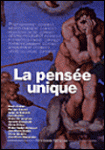 Journaliste,
Journaliste,